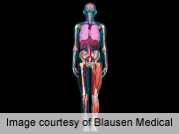healthnewslink
Heart Disease Newsletter
October 8, 2012 |
| In this Issue |
|
|
|
|
Severe Anemia Linked to Higher Death Risk After Heart Surgery
Condition should be treated before elective procedures if possible, researcher says
 THURSDAY, Oct. 4 (HealthDay News) -- Anemia is a risk factor for complications and death following heart surgery, and elective heart surgeries should be delayed to treat moderate to severe anemia, a new study suggests.
In the study, Italian researchers compared the outcomes of 401 adult heart surgery patients with severe anemia and 401 heart surgery patients without severe anemia. The patients with severe anemia were nearly twice as likely to die and had a greater risk of stroke, prolonged mechanical ventilation and longer stays in the intensive care unit following surgery.
Similar results were found in patients with moderate anemia, according to the study in the October issue of The Annals of Thoracic Surgery.
"Unlike other recognized risk factors for cardiac surgery patients, such as advanced age and poor kidney function, anemia can be corrected with iron supplementation and medications that stimulate red blood cell production," lead author Dr. Marco Ranucci said in a news release from the Society of Thoracic Surgeons. "Unfortunately, to correct anemia we need two to three weeks before the operation, which may be too long for many patients to wait."
In people with anemia, the blood does not carry sufficient oxygen to the rest of the body. Blood loss, iron-poor diet or insufficient iron absorption from food all can lead to iron-deficiency anemia. Older adults are at risk for this common, easily treated anemia, the researchers noted.
Under current risk models, anemia is not considered a risk factor for survival following heart surgery, according to the release.
"Until it can be clearly demonstrated that correcting anemia improves outcomes, I think that working to correct and preserve the natural hemoglobin in a patient's blood prior to surgery is a viable and safe option," Ranucci said.
The study presents a convincing case for adding severe anemia to current models used to calculate the risks faced by heart surgery patients, Jeremiah Brown, an assistant professor at the Dartmouth Institute for Health Policy and Clinical Practice at the Geisel School of Medicine in Hanover, N.H., wrote in an accompanying journal commentary.
While the study found an association between severe anemia and post-heart surgery death risk, it did not prove a cause-and-effect relationship.
More information
The U.S. National Heart, Lung, and Blood Institute has more about heart surgery.

|
Stem Cell Transplant May Spur Heart Disease Risk: Study
Chemotherapy, radiation before transplant linked to elevated threat
 WEDNESDAY, Oct. 3 (HealthDay News) -- People who undergo the transplantation of stem cells taken from bone marrow, circulating blood or umbilical cord blood are more likely to develop risk factors for heart disease, such as high blood pressure, diabetes and high cholesterol, a new study contends.
Researchers from the American Society of Hematology noted that patients who were treated with chemotherapy or radiation before such a transplant -- called a "hematopoietic cell transplant," or HCT -- had a significantly higher risk for heart disease later in life.
"While we know that heart disease is a real concern for long-term HCT survivors, small sample sizes and a lack of long-term follow-up in previous studies have only allowed us to look at a small piece of the puzzle of how this chronic condition develops in these patients," the study's first author, Dr. Saro Armenian, medical director of the Pediatric Survivorship Clinic in the Childhood Cancer Survivorship Program at City of Hope in Duarte, Calif., said in a society news release.
"Our study sought to better determine the specific factors before and after transplant that can lead to heart disease in a large group of transplant recipients," Armenian explained.
In conducting the study, the researchers examined the medical records of nearly 1,900 hematopoietic cell transplant recipients to identify factors that could affect their development of risk factors for heart disease. The transplants occurred between 1995 and 2004, and the patients survived for at least one year after the treatment.
The investigators considered the patients' exposure to chemotherapy or radiation before the transplant, the type of hematopoietic cell transplant and whether they were treated for a serious transplant complication known as graft-versus-host disease.
Using the U.S. National Health and Nutrition Examination Survey, the researchers also projected heart disease risk factor rates for the general population.
The study found that high blood pressure, diabetes and high cholesterol were more common among long-term survivors of the blood-forming stem cell transplants.
The risk for developing diabetes was 1.5 times higher for hematopoietic cell transplant survivors who underwent total body radiation. Their risk for high cholesterol was 1.4 times higher. The researchers noted this was true regardless of the type of blood-forming stem cell transplant the patient received.
Although it's unclear why total body radiation increased these patients' risk for diabetes and high cholesterol, previous studies have shown that abdominal radiation may contribute to insulin resistance and an increase in belly fat among cancer patients.
After examining data on the type of transplant the patients received, the researchers found that those who had received stem cells from a donor were at much higher risk for developing high blood pressure, diabetes or high cholesterol than patients who had received blood-forming stem cells from their own body.
The study also found that 45 percent of the patients who received donor stem cells developed high blood pressure, nearly 21 percent developed diabetes and 50 percent developed high cholesterol within 10 years. Meanwhile, only 32 percent of those who received stem cells from their own body had high blood pressure, about 16 percent had diabetes and 43 percent had high cholesterol within 10 years of their transplant.
The patients who received donor stem cells and were also treated for graft-versus-host disease had the highest risk of developing heart disease risk factors. The investigators found that nearly 55 percent of these patients developed high blood pressure, just less than 26 percent developed diabetes and about 53 percent developed high cholesterol over the course of the decade-long study.
These patients also developed risk factors for heart disease more quickly than the other patients, the study authors noted. The median time to the development of high blood pressure and high cholesterol was just 2.5 months. Meanwhile, people who received their own stem cells developed high blood pressure after a median time of 3.7 years and high cholesterol after a median time of 1.6 years.
The study also revealed that recipients of donor stem cells also developed diabetes more than two years sooner than other hematopoietic cell transplant patients.
The researchers added that 115 of the study participants developed heart disease at a median rate of four years after their stem cell transplant. After 10 years, nearly 8 percent of the patients had heart disease. That rate surpassed 11 percent for patients with heart disease risk factors. The study also showed that the rate jumped to 18 percent for patients who had previously received treatment for chemotherapy or radiation.
"Our findings show that the process of receiving a stem cell transplant alone increases a recipient's risk of developing heart disease," Armenian said in the news release. "However, the type of transplant and whether the recipient was treated for [graft-versus-host disease] can also increase that survivor's heart disease risk as well."
"The results of this study demonstrate the importance of intervention strategies that can help mitigate these modifiable heart disease risk factors in transplant recipients before and after transplant, and we hope they can serve as a basis for creating a predictive model to identify those patients at highest risk of developing heart disease."
The study was published online Oct. 3 in the journal Blood.
Although the study found an association between certain factors in stem cell transplant patients and increased heart disease risk factors, it didn't prove that a cause-and-effect relationship exists.
More information
The U.S. National Institutes of Health provides more information on stem cell transplants.

|
Study: Blood Tests for Inflammation Could Help Prevent Heart Attack, Stroke
But the tests would uncover risk in relatively few people, evidence review finds
 WEDNESDAY, Oct. 3 (HealthDay News) -- Among people at high risk for cardiovascular disease, knowing their blood levels of two specific markers for inflammation might help prevent a heart attack or stroke, according to British investigators.
The two markers, C-reactive protein and fibrinogen, are produced in the liver in response to inflammation in the body. Whether measuring their levels can indeed stave off a cardiovascular event is a topic of scientific debate, the researchers said.
The new analysis suggests that although such testing would save some people from suffering a heart attack or stroke, the proportion of those benefited would not be large. The issue then becomes whether widespread testing is worthwhile.
"In a study of people without known cardiovascular disease, we estimated that under current treatment guidelines, one extra cardiovascular disease outcome would be prevented over a period of 10 years for approximately every 440 people in whom [C-reactive protein] levels were assessed or approximately every 490 people in whom fibrinogen levels were assessed," said lead researcher Dr. Emanuele Di Angelantonio, a lecturer in medical screening at the University of Cambridge.
The report was published in the Oct. 4 issue of the New England Journal of Medicine.
For the study, Di Angelantonio's team analyzed 52 studies that included more than 246,000 people who had no history of cardiovascular disease.
In this type of study, called a meta-analysis, researchers attempt to glean patterns from disparate sources to make a point not usually included in the original studies. The weaknesses of a meta-analysis are the inherent problems in the individual studies and the difficulty in fitting the data together.
In the new analysis, the group found that measuring C-reactive protein or fibrinogen, along with other standard tests such as blood pressure and cholesterol, in about 13,000 people identified as being at risk for cardiovascular disease could prevent a few strokes and heart attacks over time.
"If [C-reactive protein] or fibrinogen was assessed in people considered to be at intermediate risk after initial screening with the use of conventional risk factors alone -- and if such measurement of a biomarker of inflammation were to be coupled with initiation of statin [therapy] -- our data suggests [that such assessment] could help prevent approximately 30 additional cardiovascular events over the course of 10 years," Di Angelantonio said.
Dr. Gregg Fonarow, professor of cardiology at the University of California, Los Angeles, and a spokesman for the American Heart Association, said: "Many prior studies have demonstrated that blood tests for C-reactive protein and fibrinogen, when assessed in isolation, are predictive of subsequent cardiovascular events.
"However, the extent to which these tests offer incremental value beyond traditional-risk cardiovascular-risk models has not been well defined and is the subject of much debate," he said.
This study suggests that the addition of C-reactive protein or fibrinogen to traditional risk factors does slightly improve risk identification, Fonarow said.
"However, the value of testing appears to be marginal," he said. "It is estimated that it would require screening 400 to 500 intermediate-risk individuals to prevent a single cardiovascular event over a 10-year period."
Moreover, the cost of the test compared to its predictive value may make it cost ineffective, Fonarow said.
"The cost of [C-reactive protein] testing for cardiovascular disease is approximately $60 to $150 depending on which laboratory is used, and this cost may or may not be covered by health plans," he said.
More information
To learn more about cardiovascular disease, visit the American Heart Association  . .

|
'Junk Food' May Significantly Hike Risk of Stroke, Researchers Say
Western diet tied to health problems in young rats after just 2 months, study finds
 WEDNESDAY, Oct. 3 (HealthDay News) -- People who eat a so-called "Western diet," which is high in fat, salt and sugar, are at significantly greater risk for stroke or premature death, according to a new study involving rats.
Researchers from Canada found this type of food, also known as the "cafeteria diet," creates what they called "a ticking time bomb of health problems."
For the study, the researchers gave sedentary rats a choice of nutritional food pellets or junk food items including cookies, sausage and cupcakes. The animals were also given a choice of water or a 30 percent sugar solution that imitated soft drinks.
Like humans, the researchers said, the rats preferred the treats. And after eating a high-calorie, high-sugar and high-sodium diet for just two months, they developed symptoms of a condition known as metabolic syndrome, including high blood pressure, high cholesterol and blood sugar levels, and obesity -- factors that increase the risk of stroke and other health problems.
The researchers noted that the rats were only the equivalent of about 16 to 22 years old in human years.
"I think we'll soon start to see people in their 30s or 40s having strokes, having dementia, because of this junk food diet," the study's lead researcher, Dr. Dale Corbett, scientific director of the Center for Stroke Recovery at Canada's Heart and Stroke Foundation, said in a foundation news release. "Young people will have major, major problems much earlier in life."
The study authors said their findings underscore the need for regular exercise and a well-balanced diet to prevent metabolic syndrome.
"We're not sure whether metabolic syndrome can be reversed," noted Corbett. "If it can't, and we continue to live and eat like this, then we're each a ticking time bomb of health problems," he added.
Another expert, Dr. Mark Bayley, co-chair of the Canadian Stroke Congress and medical director of the Neurological Rehabilitation Program at Toronto Rehab, pointed out in the news release that "metabolic syndrome and stroke are huge health concerns for the public. We cannot afford to continue making poor nutritional choices. Our diet is killing us."
The study authors concluded that more research is needed to investigate the risks of a poor diet on animals that have other health issues.
"Laboratory models often use relatively young animals who are healthier and on better diets than we are," Corbett noted. "However, it is important to remember that for many people, the consequences would be even worse, since a lot of people with stroke also have pre-existing health problems."
The study was scheduled to be presented Monday at the Canadian Stroke Congress, in Calgary. The data and conclusions of research presented at meetings should be viewed as preliminary until published in a peer-reviewed journal. In addition, experts point out that results from animal research are not necessarily applicable to humans.
And while the study found an association between the unhealthy diets and an increase in health risk factors in the rats, it didn't prove a cause-and-effect relationship.
More information
The U.S. National Stroke Association has more about stroke risk factors.

|
| Copyright © 2012 ScoutNews, LLC. All rights reserved. |
|